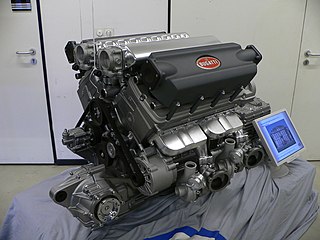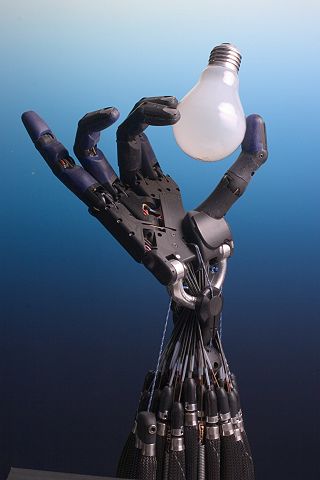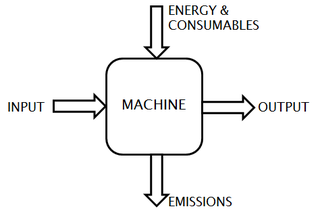
Control engineering or control systems engineering is an engineering discipline that deals with control systems, applying control theory to design equipment and systems with desired behaviors in control environments. The discipline of controls overlaps and is usually taught along with electrical engineering and mechanical engineering at many institutions around the world.

Mechanical engineering is the study of physical machines that may involve force and movement. It is an engineering branch that combines engineering physics and mathematics principles with materials science, to design, analyze, manufacture, and maintain mechanical systems. It is one of the oldest and broadest of the engineering branches.

Mechatronics engineering also called mechatronics, is an interdisciplinary branch of engineering that focuses on the integration of mechanical, electrical and electronic engineering systems, and also includes a combination of robotics, electronics, computer science, telecommunications, systems, control, and product engineering.
Automotive engineering, along with aerospace engineering and naval architecture, is a branch of vehicle engineering, incorporating elements of mechanical, electrical, electronic, software, and safety engineering as applied to the design, manufacture and operation of motorcycles, automobiles, and trucks and their respective engineering subsystems. It also includes modification of vehicles. Manufacturing domain deals with the creation and assembling the whole parts of automobiles is also included in it. The automotive engineering field is research intensive and involves direct application of mathematical models and formulas. The study of automotive engineering is to design, develop, fabricate, and test vehicles or vehicle components from the concept stage to production stage. Production, development, and manufacturing are the three major functions in this field.

A reconfigurable manufacturing system (RMS) is one designed at the outset for rapid change in its structure, as well as its hardware and software components, in order to quickly adjust its production capacity and functionality within a part family in response to sudden market changes or intrinsic system change.

The Gokongwei College of Engineering of De La Salle University is one of eight colleges that comprise the University. It was established in 1947 with the aim of providing young men who are knowledgeable in science and technology to help rehabilitate the Philippines, which was then devastated in the aftermath of World War II.
VIB is a research institute located in Flanders, Belgium. It was founded by the Flemish government in 1995, and became a full-fledged institute on 1 January 1996. The main objective of VIB is to strengthen the excellence of Flemish life sciences research and to turn the results into new economic growth. VIB spends almost 80% of its budget on research activities, while almost 12% is spent on technology transfer activities and stimulating the creation of new businesses, in addition VIB spends approximately 2% on socio-economic activities. VIB is member of EU-LIFE, an alliance of leading life sciences research centres in Europe.
Science and technology in Flanders, being the Flemish Community and more specifically the northern region of Belgium (Europe), is well developed with the presence of several universities and research institutes. These are strongly spread over all Flemish cities, from Kortrijk and Bruges in the Western side, over Ghent as a major university center alongside Antwerp, Brussels and Leuven to Hasselt and Diepenbeek in the Eastern side.

Manufacturing engineering or production engineering is a branch of professional engineering that shares many common concepts and ideas with other fields of engineering such as mechanical, chemical, electrical, and industrial engineering. Manufacturing engineering requires the ability to plan the practices of manufacturing; to research and to develop tools, processes, machines and equipment; and to integrate the facilities and systems for producing quality products with the optimum expenditure of capital.

Robotics is an interdisciplinary branch of computer science and engineering. Robotics involves the design, construction, operation, and use of robots. The goal of robotics is to design machines that can help and assist humans. Robotics integrates fields of mechanical engineering, electrical engineering, information engineering, mechatronics, electronics, bioengineering, computer engineering, control engineering, software engineering, mathematics, etc.
The following outline is provided as an overview of and topical guide to robotics:
The NUST School of Mechanical and Manufacturing Engineering, commonly known by its acronym NUST-SMME, located in Islamabad, Pakistan, is a constituent school offering undergraduate and postgraduate programs in the fields of mechanical and manufacturing engineering. It was founded in 2008.

Ecomechatronics is an engineering approach to developing and applying mechatronical technology in order to reduce the ecological impact and total cost of ownership of machines. It builds upon the integrative approach of mechatronics, but not with the aim of only improving the functionality of a machine. Mechatronics is the multidisciplinary field of science and engineering that merges mechanics, electronics, control theory, and computer science to improve and optimize product design and manufacturing. In ecomechatronics, additionally, functionality should go hand in hand with an efficient use and limited impact on resources. Machine improvements are targeted in 3 key areas: energy efficiency, performance and user comfort.
Industrial and production engineering (IPE) is an interdisciplinary engineering discipline that includes manufacturing technology, engineering sciences, management science, and optimization of complex processes, systems, or organizations. It is concerned with the understanding and application of engineering procedures in manufacturing processes and production methods. Industrial engineering dates back all the way to the industrial revolution, initiated in 1700s by Sir Adam Smith, Henry Ford, Eli Whitney, Frank Gilbreth and Lilian Gilbreth, Henry Gantt, F.W. Taylor, etc. After the 1970s, industrial and production engineering developed worldwide and started to widely use automation and robotics. Industrial and production engineering includes three areas: Mechanical engineering, industrial engineering, and management science.

Yoram Koren is an Israeli-American academic. He is the James J. Duderstadt Distinguished University Professor Emeritus of Manufacturing and the Paul G. Goebel Professor Emeritus of Engineering at the University of Michigan, Ann Arbor. Since 2014 he is a distinguished visiting professor at the Technion – Israel Institute of Technology.

Maarten Steinbuch is a high-tech systems scientist, entrepreneur and communicator. He holds the chair of Systems & Control at Eindhoven University of Technology (TU/e), where he is Distinguished University Professor. His research spans from automotive engineering to mechatronics, motion control, and fusion plasma control. He is most known for his work in the field of advanced motion control, as well as in robotics for high precision surgery. Steinbuch is a prolific blogger and a key opinion leader on the influence of new technologies on society. He is well known as an advocate of electric vehicles.
John William Sutherland is professor and Fehsenfeld Family Head of Environmental and Ecological Engineering (EEE) at Purdue University who specialises in the application of sustainability principles to design, manufacturing, and other industrial issues.
Mohsen (MO) Shahinpoor is an Iranian American engineer, scientist, and academician. He is a professor and Director at the University of Maine College of Engineering, Department of Mechanical Engineering. He is also a professor in the Graduate School of Biomedical Science and Engineering at the University of Maine.

Ali Galip Ulsoy is an academic at the University of Michigan (UM), Ann Arbor, where he is the C.D. Mote, Jr. Distinguished University Professor Emeritus of Mechanical Engineering and the William Clay Ford Professor Emeritus of Manufacturing.

Stephen Malkin was an American engineer. He taught at the University of Texas at Austin, the University at Buffalo, the University of Massachusetts Amherst, and Technion – Israel Institute of Technology.












